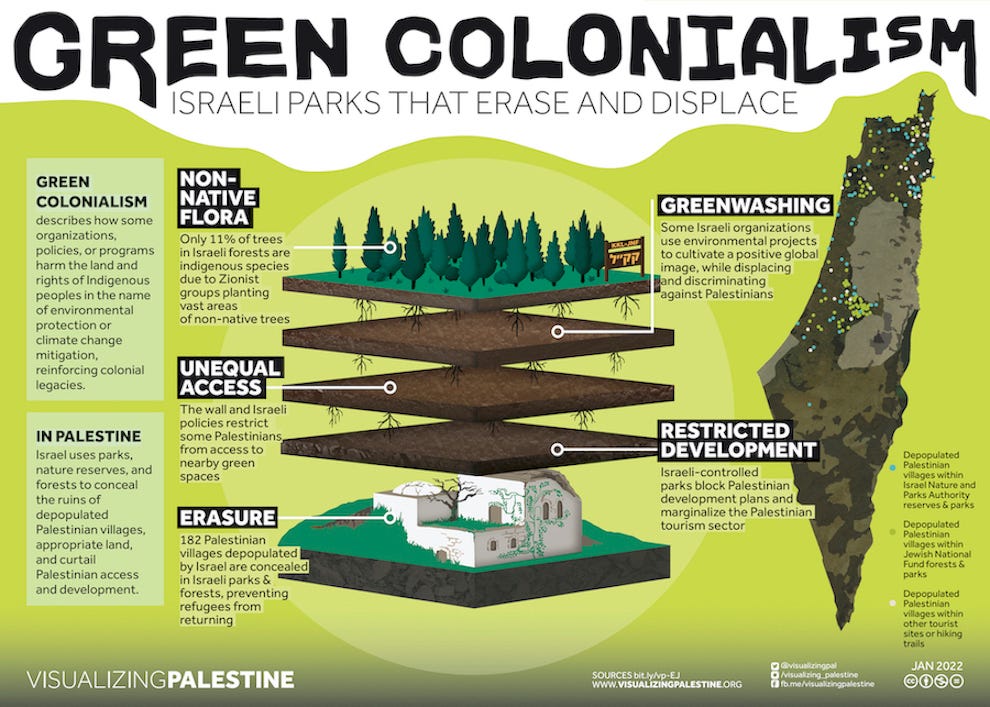☠️✨The Nexialist #0145
medusa deluxe | the fall of the house of usher | an apocalyptic meditation on doomscrolling | dance of poison | warmer climate, spicier food | hooked on opium | green colonialism | gaza, explained
Welcome to another fresh batch of new e-synapses, the nexialist
hello, world! i hope this message finds you well and makes you stop scrolling. this week, i’m happy to have some halloween distractions. juan and i went to another gay halloween party (that was the name of the party) and dressed as barbenheimer. i just love to see the effort and the creativity, like this person dressed as a swan dressed as björk wearing her iconic swan dress. i also share with you other happenings of my week in the body of this newsletter. keep reading until the end for some poisonous content, spicy stuff, an apocalyptic meditation, scrolling modalities, and a good dose of hard-to-swallow truth. you can scroll now. a big hug 🫂✨
1 year ago » 🛼✨The Nexialist #0093 : Lula wins | left and right | tribal traps & how to argue | why you are lonely | love, hatred, danger | you are beautiful | tocar você | no more regrets | seasonal change | cultural production
2 years ago » 🤞✨The Nexialist #0043 : 2030 or 2050? | Lo-Tek: A New Mythology of Technology | Spiritual Disco | Gods Of The Disco | HOMUNCULUS | Unstuck in Time | Mugler | Neo-Surf
🪮medusa deluxe
last week my friend françois and i had a movie night and we had the chance to watch this work of art: medusa deluxe. my first thought when the movie finished was that a new cult camp classic is born. the absurdity of the story, the hairdos, the drama, the acting… all delivered in a one-shot fashion.
brainsparks: notes on camp (tn#12), A24’s gift shop (tn#89)
🐦⬛the fall of the house of usher
mike flanagan’s series got me hooked last week (thank you, juan!) the series is inspired by different poems by edgar allan poe, some of which i was familiar with. it’s nice to see how they managed to stitch together parts of different works into a contemporary story: a powerful family behind pursue fortunato pharma, responsible for the american opioid crisis. the nice kind of horror, where we see him and his family doomed in agony and ugly deaths. i have to say, though, that some elements were a bit off, and i even thought it might have been written by AI. but maybe i’m overthinking it.
brainsparks: the cult of the occult (tn#144)
📱an apocalyptic meditation on doomscrolling
this text by erik davis caught me by the title, and it was worth it. “the next time you catch yourself doomscrolling, take it as an invitation to own your own horror.” the imagery which i hadn’t yet realized was that of the ancient scrolls that are today infinite in our black mirrors. it’s mind-bending.
That doom is frequently inscribed, reminding us of another dread resonance lurking in our neologism. For what is a doom written on if not a scroll? As a verb, digital “scrolling” is not quite a skeuomorph, but something close: the resurrection of an anachronistic media practice inside a contemporary one. But it’s the noun that holds the prophetic gravitas here. The Revelation of Saint John is awash with scrolls, including the famous one with seven seals, which unleashes the end-times brigade. The cosmos itself becomes a scroll in the book’s sixth chapter, with the sky receding “as a scroll when it is rolled up, and every mountain and island was moved out of its place.” Still later, an angel brings John a “little scroll” — with 5G hopefully — that he is commanded to eat — that is, to consume. He tells us it tastes sweet at first, and then sickens him with bitterness. Another blaze of petrol.
it got me thinking on all the modalities of scrolling that have emerged. when i google it, it takes me to programming articles and tutorials, but what i’m thinking about are the ways we happen scroll. for instance:
-boonscrolling: this one is even in the urban dictionary, as the opposite of boonscrolling. when we are looking for uplifting content and connection.
-dumbscrolling: i actually think this is more common than doomscrolling and doesn’t get as much attention. when we are scrolling and losing brain cells, consuming pointless content. i think some sources call it aimless scrolling.
-escapescrolling: i’m proposing this as another modality. you’re scrolling to escape reality. and when content that brings you the harsh reality appears (i.e. violence or bad news that you don’t want to face), you pick up the pace and move ahead to the next distraction. (i’m using “you” but i’m talking about me.).. or… is all scrolling escapism? 🤯
there are probably other modalities, but these have been visiting my scrolling modes.
But who is the top in this scenario? Within the fantasy that drives doomscrolling, we may imagine that we are finally submitting to Reality, to the hard fact of a world collapsing like dominoes. But we are really bending down before our feeds. In this game, media is the Master.
brainsparks: boonscrolling (tn#91), infoxication (tn#96), content diet (tn#2), personal machines and portable worlds (tn#132)
☠️dance of poison
this text by noah whiteman got my attention: “How The Dance of Poison Shapes Nature and Mankind: The wars of nature and the wars of nations share surprising toxic roots.” i do remember that a great deal of trade (and war) had spices in their center. what i had forgotten is how some of these can be seen as poisons, due to their toxins.
Poisons have guided evolutionary and human history, for good and for bad, from monarchs and milkweeds to spices and vices. They’ve provided rich substrates for innovation, from the monarch’s evolutionary defenses to the invention of the first birth control pill. Unchecked, however, poisons can be our downfall. Our uniquely human capabilities and shortcomings require a fettered relationship with nature’s toxins—one where its endless diversity can be tapped for remedies and cures, but where moderation and balance set guardrails against our own toxic pursuits and desires.
brainsparks: biology enables, culture restricts (tn#82)
🌶️warmer climate, spicier food
i’m telling you, the synchronicity happens on this nexialist’s screen. after reading about the dance of poisons (including peppers), this infographic showed up on my screen. warmer climate, spicier food (with some exceptions). i had to giggle with the “much of Europe is spice-less” title, because, well, it’s true.
The researchers suggest other explanations for why people in hot countries tend to eat spicier food. One possibility is that it’s because spices help preserve food in hot climates. Another is that people in hot countries have developed a taste for spicy food because it helps them cool down.
🇬🇧hooked on opium
with the flood of opioid crisis content, a term from history class came to mind: the opium wars. i didn’t remember what that was all about, but this video reminded me. it’s worth watching to remind us of the atrocities and horror that imperialism, colonialism and greed can bring.
By the 1830s, people from every level of Chinese society were hooked on opium. After Emperor Daoguang received reports of mass addiction all over the country, he’d had enough. Soldiers burned all the opium they found. British traders lost 20,000 chests of opium, equivalent to about £2 million. This led to the First Opium War, in 1839. The British were so angry that their drugs had been stolen that they sent troops to the region to demand economic reparations for the financial losses they’d incurred while illegally trafficking narcotics into a foreign country. They were also angry that China refused to open up more ports to British trade and had disrespected their traders. Back in the UK, the press depicted the Chinese as barbarians who had insulted the honor of Brits abroad. In an act of war, Britain occupied Hong Kong, then a sparsely inhabited island off the southeast coast of China.
♻️green colonialism
this week’s syllabus had a link about green colonialism, but it was in german. “It addresses the ecological and social consequences of mining materials like lithium for e-cars and green energy, emphasizing their destructive impacts, especially in the Global South.”
i hadn’t heard of this term before, and after googling something to share here, i came across very clear infographics on visualizing palestine: between a rising tide and apartheid. it’s a series of 4 infographics about palestinian climate vulnerability, green colonialism, toxic occupation and colonial extraction. the kind of green colonialism their are experiencing is different from this.
green colonialism describes how some organizations, policies or programs harm the land and rights of indigenous peoples in the name of environmental protection or climate change mitigation, reinforcing colonial legacies.
brainsparks: climate violence (tn#131), sportswashing (tn#96), technowashing (tn#67)
🇵🇸gaza, explained
if you are from my generation, you have been hearing about the gaza strip since childhood. i never understood what that actually meant until the recent escalation. here is a 15-minute contextualizer video on how things got where they are today.
But just a few months after the war even though Palestinians now lived under Israeli control... they began to be referred to as “non-citizens” or “foreign residents” in official Israeli documents. You inherit the status from your parents and grandparents. Being a stateless, unrecognized, with no rights... and you know this impacts your life.
🗺️map explainer
quite a detailed map of the gaza strip shared in the visual capitalist. it just gives more dimension and understanding of the area, the infrastructure and the size.
While conflict in that part of the world is thoroughly covered in headlines and news stories, more basic facts about Gaza receive less attention. With this infographic, we aim to fill in some of those gaps, including demographics, infrastructure, and more.
see you next week, poppies🫀✨
❓If you want to know what a Nexialist is, click here.
🔎If you want to see what I’ve already posted, visit the archive and use the search engine. Even I do that a lot.
💌I want to know what you think/who you are! Your feedback is highly appreciated; you can e-mail me or fill in this short survey. Thank you! 🙏🏻
🔌Let’s Collab?
I truly believe innovation comes from bringing improbable areas together, and that’s why I called this project The Nexialist. Some sectors are known to be self-referencing and hermetic. Sometimes teams are on autopilot mode, focused on the daily grind, which hinders innovation. As a Nexialist, I like to burst these bubbles, bringing references from different areas, and maintaining teams inspired and connected to the Zeitgeist.
I offer inspiration sessions called Brainsparks, creative desk research (Zeitgeist Boost), Plug’n’Play deals for workshops and sprints, and other bespoke formats. If you want to know more about this, send me an e-mail with your challenge(s) and we can figure something out together. Check out my website and some work I’ve done below:









